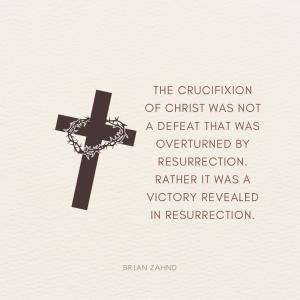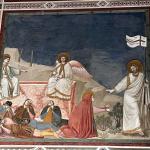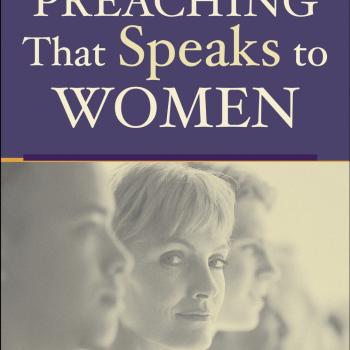 We are less than two weeks from Easter, deep in the Lenten season but looking toward the cross on Good Friday. As part of my Lenten discipline, I’ve been reading Brian Zahnd’s newest book, The Wood Between the Worlds: a Poetic Theology of the Cross. Zahnd offers thoughtful, sometimes controversial but always reverent reflections on the complex meanings found in the crucifixion of Jesus Christ. The back cover copy summarizes the book well: “Just as gazing through the eyepiece of a kaleidoscope reveals a new geometric image with every turn, Zahnd helps us see that there are infinite ways to behold the cross of Christ as the beautiful form that saves the world.”
We are less than two weeks from Easter, deep in the Lenten season but looking toward the cross on Good Friday. As part of my Lenten discipline, I’ve been reading Brian Zahnd’s newest book, The Wood Between the Worlds: a Poetic Theology of the Cross. Zahnd offers thoughtful, sometimes controversial but always reverent reflections on the complex meanings found in the crucifixion of Jesus Christ. The back cover copy summarizes the book well: “Just as gazing through the eyepiece of a kaleidoscope reveals a new geometric image with every turn, Zahnd helps us see that there are infinite ways to behold the cross of Christ as the beautiful form that saves the world.”

Throughout the book, he asserts that, while the crucifixion signifies atonement, it also means much more. The death of Jesus also signified victory over sin and death, a ransom in which Jesus gave himself up to death then crushed it when the Father raised him up again. He is the slain Lamb of God who will usher in the ultimate Shalom (peace) in his eternal kingdom. He wasn’t killed by the Romans so much as he gave himself up on purpose as part of his grand plan to effect redemption, new life, and peace for his people.

Zahnd is a self-proclaimed pacifist, espousing a philosophy of non-violence that pops up occasionally in the book. In one particular chapter, he confronts violence head-on, arguing that the Jesus who blessed the poor in spirit, humble, merciful, and peacemakers (Matthew 5:3–9) is the same Jesus who will return as the Lion of Judah (Revelation 5:5). The Lion of Judah is a victorious king, but the means of his victory is the cross, where he defeated evil, death, and Satan. When he returns to bring his kingdom, the sword coming from his mouth (Rev. 1:16) is his Word.
Theologies that proclaim the violent, bloody end of the world at Jesus’s Second Coming are, Zahnd argues, bifurcating the person of Jesus and nullifying the significance of his crucifixion. Jesus died to defeat death, not to use death to defeat his enemies. His message was love and humility, not dominance by force. So the popular sayings along the lines of “Jesus went out like a lamb but he’s coming back as a roaring lion” misunderstand the allegorical and symbolic nature of the book of Revelation, from which those images come.
Divine Appointment?

I read that chapter early Monday morning, then hopped in the car for my 20-minute commute. One of my regular podcasts releases new episodes on Mondays, so I began listening to the Alabaster Jar, hosted by Dr. Lynn Cohick of Houston Christian University (also my doctoral advisor). Her guest was Rev. Dr. Helen Paynter, author of Blessed Are the Peacemakers: A Biblical Theology of Human Violence. Their discussion explored the definition of violence and its pervasive, personal presence in all human cultures. They explored the significance of Genesis 1–3 in understanding violence and the goodness of God, particularly as it pertains to women. They also touched on shame, justice, peace, Jesus’s views on violence, the significance of his resurrection, and how to understand suffering biblically.
Huh. Interesting timing.
Together, the book and podcast are immersing me in what the Bible says about the role of violence in the Christian life. One point Paynter made: when Jesus arose, he sought out the disciples who failed (Peter) and missed him (Thomas), but he left alone those teachers and rulers who had him killed. Revenge was not his priority; neither was flaunting his glorified, living body in front of them. He focused on consoling and commissioning Mary, reconciling Peter, finding Thomas, sending his followers, and encouraging them about the future.
The future, eschatologically speaking, is peace. Eternal shalom—wholeness, health, satisfaction, joy, completeness—this is the destination we will experience with Christ our king. It does seem counter-intuitive to think he will bring it about through mass destruction. But the topic demands further study. I have not heard or read enough to determine my own views. These resources challenge the theology of my training and even my church, and rather than be afraid of different ideas I’m determined to explore them.
It’s always good to ask ourselves, “What if I’m wrong?”
Learning about the Cross Together
What have you generally believed about the role of violence in the life of a Christian?
How has the theology of the cross been taught to you? Which aspects do you support and which do you question?
To what extent have you considered your own culpability in systems that maintain violence, such as the chocolate or textile industries founded on labor trafficking?
What resources could you suggest to someone interested in Jesus’s perspective on violence, peace, and his kingdom?












